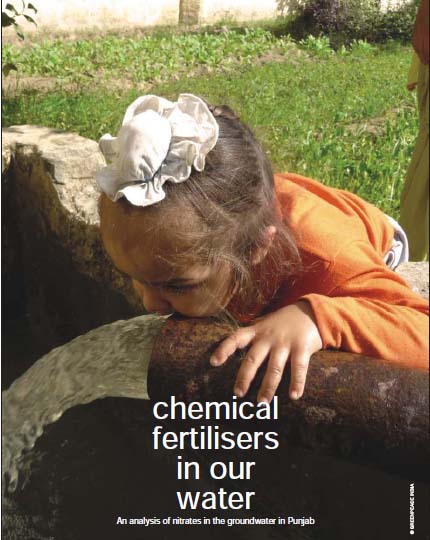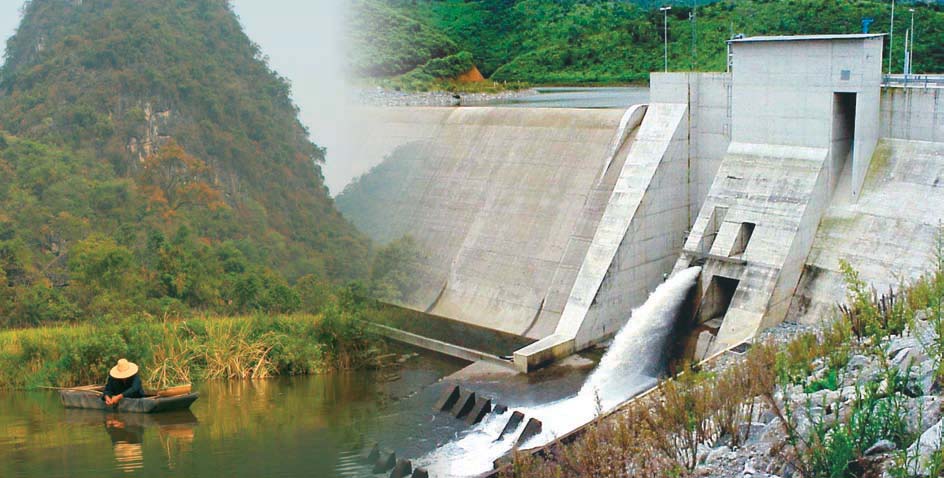/regions/political
Political
Use of ICT for effective urban governance and service delivery in India - A selection of cases - ASCI and CISCO
Posted on 31 Oct, 2011 09:17 AMThis compendium published by Administrative Staff College of India (ASCI) and CISCO presents selective cases on the use of ICT for effective urban governance and service delivery in India. The document includes the following chapters/sections:
Chemical fertilizers in our water - An analysis of nitrates in the groundwater in Punjab by Greenpeace
Posted on 31 Oct, 2011 09:00 AM The level of nitrate in drinking water was tested from groundwater artesian wells located within farms and surrounded by crops (mostly rice and wheat rotations).
The level of nitrate in drinking water was tested from groundwater artesian wells located within farms and surrounded by crops (mostly rice and wheat rotations).
Nitrate pollution in groundwater is associated with nitrogen loads in the environment. In urban areas, it is associated with sewage and in agriculture areas, with livestock sources and nitrogen fertiliser inputs. Nitrate pollution in drinking water can have serious health impact on humans, especially for babies and children. The most significant potential health effects of drinking water contaminated with nitrate are the blue-baby syndrome (methemoglobinemia) and cancer.
Alternative national water policy - A critique - Economic and Political Weekly
Posted on 30 Oct, 2011 04:04 PMThis article published in the discussion section of the Economic and Political Weekly is a critique of the National Water Policy: An alternative draft for consideration, proposed by Ramaswamy Iyer, published in the Economic and Political Weekly, June 25th 2011.
Fisheries and livelihoods in Tungabhadra basin: Current status and future possibilities – A working paper by Institute for Social and Economic Change
Posted on 30 Oct, 2011 01:02 PMThis study by Institute for Social and Economic Change (ISEC) aims at understanding the livelihood patterns of fishermen within the Tungabhadra sub basin, a tributary of river Krishna located in peninsular India. Lack of integrated approach in development initiatives and water management plans warrants the need for Integrated Water Resource Management to support livelihoods. The study focuses on fisheries as a source of livelihood, current status and institutional support available, people dependant on it, development initiatives and suggestions for improvements.
Deciphering environmental flows - An article in Seminar magazine - Jayanta Bandyopadhyay
Posted on 30 Oct, 2011 10:45 AMAuthor: Jayanta Bandyopadhyay
This article published in the Seminar 626, October 2011 argues that our current state of knowledge of water systems and ecological modelling related to flows of water, which includes projecting a single quantitative figure of water requirements, is inadequate. Such a unilateral prescription of environmental flows or water requirements of aquatic systems as a method for the resolution of water conflicts may actually become the source of many new conflicts.
Sanitation in India: Progress, differentials, correlates and challenges – A report by ADB
Posted on 30 Oct, 2011 08:14 AMThis report by Asian Development Bank (ADB) deals with sanitation in India, in particular the progress, differentials, correlates, and challenges. Improved sanitation is essential to reduce ill health, child mortality, lost income associated with morbidity, and to improve environment, human dignity, and quality of life. Goal 7, target 3 of the Millennium Development Goals (MDGs) stipulates decreasing the proportion of population without sustainable access to basic sanitation by 50 per cent in the year 2015.
Sustainable resources management for food security and sustainable livelihoods - Action - A Newsletter of AFPRO
Posted on 30 Oct, 2011 07:46 AMThese technologies include soil and water conservation measures, integrated farming, diversion based irrigation systems, sustainable agriculture, tree-based farming to name a few.
Environmental flows in water resources policies, plans, and projects - Case studies by IBRD
Posted on 29 Oct, 2011 06:34 PM This report comprising a set of case studies by International Bank for Reconstruction and Development (IBRD) presents how environmental flows is dealt with in water resources policies, plans, and projects. It focuses on the integration of environmental water allocation into integrated water resources management (IWRM) and so fills a major gap in knowledge on IWRM.
This report comprising a set of case studies by International Bank for Reconstruction and Development (IBRD) presents how environmental flows is dealt with in water resources policies, plans, and projects. It focuses on the integration of environmental water allocation into integrated water resources management (IWRM) and so fills a major gap in knowledge on IWRM.
Where and how is the state - Accessing water and the state in Mumbai and Johannesburg - Journal of Asian and African Studies
Posted on 29 Oct, 2011 05:28 PMThis paper published in the Journal of Asian and African Studies examines the argument that the political and institutional contexts of service delivery shape people's access to the state and its resources and also the mediation between citizens and g
Report of the committee on slum statistics/census - Ministry of Housing and Urban Poverty Alleviation
Posted on 29 Oct, 2011 04:12 PMThis report by the Ministry of Housing and Urban Poverty Alleviation, Government of India, is the outcome of the deliberations conducted by the committee on slum statistics/census constituted by the Ministry of Housing and Urban Poverty Alleviation in the context of the realisation that there continues